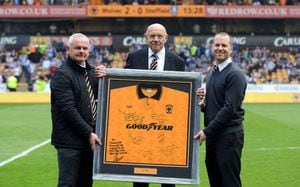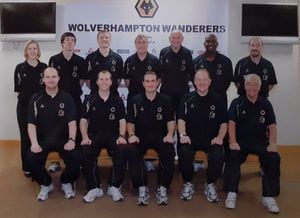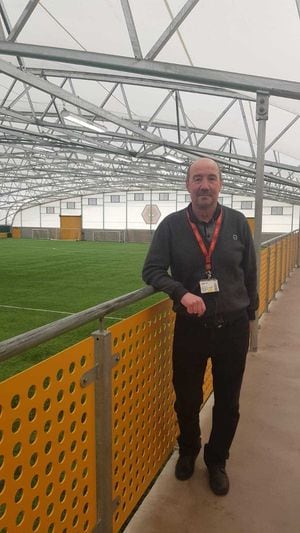Wolves throwback: Scout and about to find gems
The life of a football scout is often both gruelling and lonely.
Long hours, plenty of travel, standing on the side of open pitches with little to no protection from the elements.
And generally for scant monetary recompense, certainly when compared to some of the riches on offer throughout the rest of the sport.
But they wouldn't change it for the world.
Instead the rewards from working as a scout can be far more emotionally fulfilling and motivating.
That prize of helping a player take their first step on the rung of a ladder which could lead to a professional career. And, for the best of the bunch, a journey to the very top and potential stardom. Being there, at the start of that process? Well that can be priceless.
The excellent sportswriter Michael Calvin once wrote a book dedicated to the world of football scouting.
He called it 'The Nowhere Men' - a fascinating insight into the world of so many scouts whom he described as the 'ubiquitous yet anonymous members of football's hidden tribe' who 'possess the power of dreams'.
Wolves have been fortunate to have been blessed by many top scouts helping to shape those dreams through the years.
From the days of Wath Wanderers launched by Mark Crook after the second World War as a nursery side to feed players into Wolves, to the club's current status as a Category One Academy, the challenge of identifying young talent with the potential to go on and don the famous gold and black is a challenge which has both enthralled and enthused so many.
Among two of the most successful and indeed most long-term at a local level for Wolves were Bob Bennett and Les Green.
Both embarked on very different journeys towards working in scouting at the end of previous careers, both possess different personalities and approaches and both ultimately followed slightly different roles as part of a flourishing team.
But what they most definitely shared was a work ethic, determination and indeed passion to identify the very best of the local talent to the benefit of Wolverhampton Wanderers, whether to, ideally, progress all the way through to the first team at Molineux or, if not, build a career elsewhere.
Green was responsible for spotting the early talent, amongst many others, of the likes of Joleon Lescott, Mark Davies, Eliott Bennett and Danny Batth.
Bennett's roll of recruitment honour includes Connor Goldson, Zeli Ismail, Sam Winnall, Ashley Hemmings, Daniel Jebbison and, most recently at Wolves, Ryan Giles and Dion Sanderson, two of many still in the system either at Molineux or elsewhere.
The duo's stories and experiences however count for far more than just the players who made it through, their scouting career comprising a total of 23 years for Green and 21 for Bennett respectively.
Almost half a century of memories to discuss as we sit down over coffee at the homely Grade II listed bar at Codsall Railway Station.
It promised to be a long afternoon!
"I used to go around watching non-league games and midweeks before I was a scout," says Green, now 83, who grew up in Essex and spent most of his working life with British Telecom.
"My Dad took me to a few different games in London, and I first saw Wolves win 3-2 away at Charlton in 1949.
"It was a lovely evening, the sun was shining, there were players like Billy Wright and Jimmy Mullen in those old gold shirts and I was just blown away.
"A few years later, when I was 16, I caught the train by myself for my first home game – a 3-1 win against Arsenal when Johnny Hancocks scored a hat trick.
"From there I was hooked, I suppose you would call me a 'plastic' in today's language given it wasn't from birth but I have been watching Wolves ever since!"
Green was so taken with Wolves that he swapped Ilford for Wolverhampton in 1967, at one point went seven years without missing a game home or away, and after meeting second wife Jill, is very much settled in the area after retiring.

Then came the scouting.
"I was watching Paget Rangers, just minding my own business, when Alan Parsons – who people may know as 'Mr Boldmere St Michaels' – came over and started chatting.
"He introduced me to Ron Jukes, Wolves' chief scout, I started recommending one or two players to him, and he eventually invited me in to start working for him and Tony Painter, who was his assistant."
That was in 1992/93, and a few years later, as the recruitment team grew, Bennett, brought up in the Rough Hills area of Wolverhampton and counting Hughie McIlmoyle as his early Wolves hero, also checked in.
Both possess a considerable sporting pedigree – Green combining part-time scouting with a passion for running which continued until suffering deep vein thrombosis five years ago – and Bennett a promising striker who was with Walsall as a youngster before going on to play at a high level of non-league including locally for Bilston Town, Sedgley Rovers, Woodcross and the Wolverhampton Amateur League representative side.
Bennett, now 67, was also a runner, marathons to be precise, but when he moved to Codsall with wife Lynne in 1986, a chance meeting with then Wolves defender Mark Venus saw the two start running a Sunday League team.
From there he coached the Bilbrook Juniors team in which his son Steven was playing, and later Willenhall Town youths, before his footballing pedigree and coaching nous attracted the attention of Green and Wolves via another scout in Tony Parkes.
"They asked me if I was interested in getting into scouting, and it was probably a good time as I was still playing into my mid-forties and would probably never have stopped," Bennett explains.
"I would have just carried on playing, and was heading into self-destruct mode with injuries and so on!
"As soon as I started going along to Wolves they made me feel really welcome and I just felt that scouting would be the better option for me than coaching."
"It was a time when we were getting scouts in, they were learning the trade, and then six months later they were buggering off to other clubs," Green interjects.
"I remember saying we needed more scouts who were Wolves fans, people who would be proud to wear the Wolves shirt and tie and do it for the love of Wolves, just like I did."
Bennett certainly fitted that criteria and, even with extensive working experience behind him in sectors including engineering and insurance, remembers feeling slightly daunted among a group of around 12 scouts at an early induction-type evening in one of the executive boxes at Molineux.
"I was listening to all the experts and thinking 'I can't do this'," he recalls.
"But the next day I phoned to see if they wanted me to go anywhere and they pinpointed a game at Wilkinson Avenue in Bilston."
"Bob was the only one of that group who called us the next day to see about going to a game," adds Green.
"That said it all, and he knew so many people in football, he had all the contacts, which is so important."
In different roles the two played a pivotal part in a youth recruitment set-up fondly remembered as one of the Golden eras for players coming through the system.
In a department assembled and nurtured under the stewardship of Academy director Chris Evans, Bennett would eventually progress to a full-time position to become Head of Local Recruitment, not just scouting for talent but also overseeing operations.
Green, who may have been 'part-time' but clearly went way above and beyond all that, didn't actually take a wage from Wolves, instead receiving three season tickets as payment along with any bonuses related to his players making the grade.
"They were such great days," he recalls.

"Chris brought in some really good people to the club, particularly with Tony Lacey, who was such a fantastic head of recruitment.
"He would always have the final decision on a player, but we trusted him and respected him, and knew he really valued our recommendations."
"There were probably fewer people to do things when I started out and we all had to really muck in," says Bennett.
"Airport pick-ups, changing the Perspex on the dugouts, there were a lot of simple tasks which we would all get involved in, but all of the staff, whatever their role and whether they were full-time or part-time, were brilliant.
"I remember Les putting a system together when we'd train at Aldersley with a meet-and-greet in the foyer area which was really important for parents.
"We treated the players and their parents really well, and took that on when the Dome was built in the early 2000's.
"When I became full time I took on Les's way of operating in keeping the history together and the recommendations right by compiling a database for all our trialists detailing who had recommended them and what the outcome was.
"I left that with Wolves when I retired, and it is still in use today, like an 'A to Z' of all the trialists who have come to the Academy in the last 20 years."
Bennett brings out his iPad with a copy of the file up until he retired and it is indeed a veritable Aladdin's Cave of all those young players who at some stage had the opportunity for a trial with Wolves.
And while scouts are always very proud of the individuals whom they successfully recommend, within that framework at Wolves has always been a team ethic which is vital at any club.
There are so many others who have also given Wolves such sterling service, and to single some out runs the risk of missing out others, but the likes of Geoff Blackwell, Colin Eaton, Morris Baker and Jeff Gregory are among those mentioned in despatches.
So then, what makes a good scout? What are they looking for when watching a group of eager-to-impress and sometimes over-enthusiastic youngsters charging around a football pitch? What is it that stands out?
"Talent is obviously important but you are also looking closely at mentality," says Bennett.
"When you are watching a young player, mentality is a quality that some of them don't even know that they have.
"You watch them and you can see it, how they carry themselves, how they respond to adversity, because when it comes to that side of the game some players will sink and some will swim.
"There's one of the sayings that I had – the best ships rise in the ocean – and those are the players who, when they get into the group, go on and progress and get better."
Green agrees: "I have seen some very talented players who think they are that good that they pose.
"Professional football is one of the toughest professions you can have not just for the pressure but even within your own dressing room – the banter, it might even be called bullying.
"As Bob says, it is all about when the players reach their ceiling, as different players develop at different times.
"For me there were always two particularly big hurdles and the first of those is the age of 12, when they move from small pitches to bigger pitches.
"Can they run? Can they cover the ground? Are they athletes?

"And then, when they are 14, because that is when puberty starts to kick in, and you are beginning to see the young man.
"Those are key times, and that is why I hate the term 'wonderkid', because you might get what people think is a 'wonderkid' at the age of seven, but by 14 he is gone."
As well as technique, as well as mentality, like most opportunities in life, there is also the need sometimes, for good old-fashioned luck.
Lescott, who would make almost 250 appearances for Wolves and go on to win the Premier League with Manchester City and 26 caps for England, was brought in by Green as a box-to-box midfielder.
He came in at the age of 12, decided he wanted to step away and play for his school at 14, and then popped up again with Derby at 15 before Wolves, who still had his registration, brought him back into the fold.
Lescott was one of four spotted by Green who would go on and play in the Premier League – Davies, Elliott Bennett and Nathaniel Mendez-Laing completing the set – but as a powerhouse defender rather than a central midfielder.
Then there is the case of Goldson, actually released by Wolves at 14, who reinvented himself with Shrewsbury, took strides forward with Brighton and is now a Scottish Premier League winner with Rangers.
"I can still remember the day I first spotted Connor," Bennett recalls.
"It was over in Tividale, on a small pitch, actually on the day I was watching a young lad with a good left foot by the name of Jordan Cranston who came in to Wolves and has also gone on to have a career.
"This lad flew in and produced this fantastic tackle right in front of me and then looked straight at me as if to say 'did you see that'?
"That was Connor, and while it didn't work out for him at Wolves sometimes that is all part of the journey, and he has gone on to achieve great things elsewhere."
And therein lies the crux.
While there was of course the optimum satisfaction in recruiting players who went on to excel at Wolves, don't underestimate the level of pride at any one of them who is able to enjoy a career in the game, even in pastures new.
Alongside the practical side, the assessment of skill and technique, there is also an emotional investment made with each and every recommendation – as Bennett says, they became like 'nephews' once they are in the system.
"You just want them to do well and to carry on playing, whatever level it is at," he adds.
"We would always do our best to look after all of them, and I remember all the kind gestures, like one of the physios buying a television for one of the young lads for him to watch at home.
These interactions were not just with their own recruits and Green for example remembers the conversations that would be had with first teamers going through tough times who perhaps appreciated the candid honesty and tough love behind such dialogue.
After standing in line at a book signing for Carl Ikeme's autobiography a couple of years ago, when Green reached the front the goalkeeper rose to his feet, delivered a warm handshake, and heartfelt words of thanks before penning a poignant inscription in the book.
"I wasn't expecting that," admits Green, who is also in regular contact with Wolves' Championship-winning captain Batth.

"I sometimes think we don't realise the full impact of some of the conversations we have – maybe we say two or three things and they stick.
"Sometimes when you talk to someone you think you are taking up their time and they are just being polite but I remember chatting to Carl after he had conceded that goal against Bristol City and broken his hand afterwards.
"I realised that he wanted to talk, to know what I thought, and he took me through it all and I offered my opinion.
"Those sort of conversations can be what make you as a scout, where you can maybe just pass on a little bit of all your experience, and in return you get to see how much a player like Carl really cared."
It doesn't however have to be those hitting the heights like an Ikeme, or a Lescott, or a Goldson with whom the scouts will form a close bond.
Green and Bennett have both spotted players who have gone on and achieved elsewhere, lower down the pyramid, and in many ways that means just as much.
Green for example takes much pleasure in hearing from the mother of Ashley Vincent telling him how after a playing career and managing Worcester City, he is now coaching at Cheltenham's Academy.
Bennett will still receive appreciation from Goldson's father Nelly but also is just as delighted to take in a game at Bilston Town and have a quick 30-second chat with Jordan Kaye, whom he once took to Wolves.
There is also honour among scouts, and so when Morgan Gibbs-White took the time to seek out Bennett at a Wolves' End of Season Dinner to express gratitude for his input into the signed of his first ever contract, Bennett was quick to point out that it was scout Brian Punter who first spotted the young hopeful turning out for Stafford Juniors.
Those bonds between scout and scout, and player and scout, are often unbreakable.
Of course that works both ways, and for all the pride there can also be the pain, of seeing players receiving bad press or fan comment, dropping out of the system and sometimes struggling not just in football but also in life.
The world of scouting opens up the entire gamut of human emotions, moments of sheer happiness mixed with awful anguish, and so it is little surprise, heading into the third round of coffees, that the anecdotes continue to flow.
Some are repeatable, others less so, but the pair are almost bent double in laughter when recalling one Academy trip to Holland where the coach driver got himself so lost that he drove a 52-seater down a tiny cul-de-sac to the bemusement of two locals having a chat outside their homes.
Or memories of gently cursing when travelling to tournaments together, one taking the 'odd' pitch numbers, the other 'even', and spotting a promising player not on their pitch.
"He (Bennett) was a jammy bugger at some of those tournaments," Green laughs.
Then there are the priceless moments, of Green picking up Mr and Mrs Keane from Birmingham Airport the night before Robbie's sensational two-goal debut at Norwich.
For Bennett, of noticing only a few minutes into a Championship game with Fulham that one of his 'finds', keeper Harry Burgoyne, was making his debut. A month later he played in the FA Cup win against Liverpool at Anfield.
There are so many other discussions, little pearls of wisdom, which would all form part of an invaluable 'how to' guide to scouting were such a publication to be produced.
"I asked Ron Jukes when I started what makes a good scout and he said you keep this (points to mouth) shut, and those (points to ears) open," says Green.
"And never walk past a game, that's another thing I would say.
"As a scout you have to work bloody hard and if you are out driving and see a game on a Tuesday night, even if you are not down for it, stop the car and have a look.
"You never know what you might see, even if 99 per cent of the time you watch for ten minutes, get in the car and clear off.
"But never let a game go by."
Bennett meanwhile knows the devastation involved in players being released from the time he was called onto the pitch with his then 13-year-old son who was expecting to be told he was getting a contract at a professional club only to receive the news instead that he was being let go.
"If you are releasing players, you have to do it the right way," he implores.
"That happened to me with my lad, and so when I was the one delivering that news later on in my career, I would be sat in a room knowing just how those parents felt.
"I knew the disappointment, and so you have to do it properly, passing on all the right information, giving them the tools to hopefully pick themselves up and go again.
"It is football, it is ruthless and always will be, but there is a way to do it, and a way to give advice about whether they might be able to head off and carry on somewhere else."
Green and Bennett were both handed a fittingly royal send-off by Wolves, Green invited onto the pitch at half time of a first team fixture for a special presentation and Bennett's service marked with a surprise farewell with Molineux colleagues from all departments and video messages from those who had moved on.
Footballing life had changed inexorably during their decades of service, and has continued to do so since.
The advent of social media offers more of an insight into a young player's personality, the explosion of video analysis and increased fitness and conditioning equipment offers coaches access to a greater range of data than ever before and the increasing numbers of staff at academy level ensure no stone is left unturned.
But at the same time, there will always be a place for the overall insight of a skilled scout, the all-seeing eye taking in the whole pitch, using all their knowledge and know-how to make a reasoned judgement based on years of experience.
In that regard Green and Bennett will always be remembered as two of the very best, albeit cogs in the wheel of what they both would vehemently argue was an overall team effort delivered by so many during their era.
"Scouts don't make players, players make scouts," is Green's modest assessment, as we come to the end of three-and-a-half hours of conversation. They could probably chat for hours more.
The scouting may officially have come to an end, and both do possess interests away from football, including Bennett's long-standing talent for poetry across subjects such as travel and his ancestral Scottish roots and lovingly crafted odes to various Wolves heroes.
But watching football, having opinions on players, checking on their progress, hoping they make it through – that will never stop.
Bennett can still be found on a pitch near you, watching his grandsons, and Green took in several Wolverhampton Schools Under-11s matches enroute to the National Cup final last season, taking particular pleasure in the decision of Wolves Academy to allow all their players to be involved.
"Do you know the last player I ever scouted for Wolves was Declan Hutchings, at the age of nine?" Green reveals, as we finally come to an end.
"And this summer, he signed a scholarship with Shrewsbury.
"I don't suppose he would remember me now."
"Oh he would," adds Bob.
"His Dad Steve, I see him down the match, and he remembers."
And that is the thing. The players, their parents, the families, the friends. They remember. They will always remember. The regular messages to Green and Bennett from players privately or on social media are a cast-iron indication of that.
Both have hung on to much of the memorabilia of their Wolves employment, letters from Graham Taylor, website stories, photographs, and both continued to be honoured to be invited to junior club and league presentation nights.
Those 'ubiquitous yet anonymous members of football's hidden tribe' – Green, Bennett and so many more – exerted an influence and impact which will never be forgotten by those who owe them so much.





